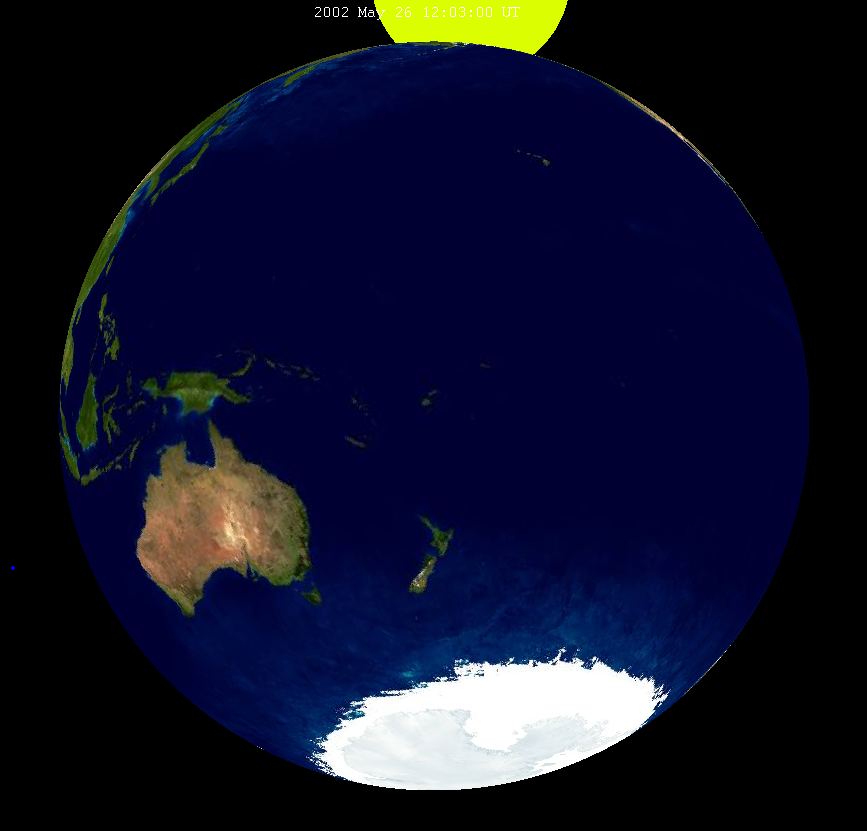May 2002 Lunar Eclipse on:
[Wikipedia]
[Google]
[Amazon]
A penumbral

Saros cycle 111
* * http://www.eclipse.org.uk/eclipse/1132002/ 2002-05 2002 in science {{lunar-eclipse-stub
lunar eclipse
A lunar eclipse occurs when the Moon moves into the Earth's shadow. Such alignment occurs during an eclipse season, approximately every six months, during the full moon phase, when the Moon's orbital plane is closest to the plane of the Earth ...
took place on May 26, 2002, the first of three lunar eclipses in 2002.
Visibility
The beginning of the penumbral phase was visible in most of North America except the northeast, Central America, western South America, extreme northeast Russia, eastern Asia, Australia, most of Antarctica, the Pacific Ocean, and the southeast Indian Ocean; the end of the eclipse was visible in southwestern Alaska, Asia except the extreme north, Australia, the eastern Indian Ocean, and most of the Pacific Ocean except the extreme eastern part.
Relation to other lunar eclipses
Eclipses of 2002
* A penumbral lunar eclipse on May 26. * An annular solar eclipse on June 10. * A penumbral lunar eclipse on June 24. * A penumbral lunar eclipse on November 20. * A total solar eclipse on December 4. It is the first of four lunar year cycles, repeating every 354 days.
Eclipse season
An eclipse season is the period, roughly every six months, when eclipses occur. Eclipse seasons are the result of the axial parallelism of the Moon's tilted orbital plane ( tilted five degrees to the Earth's orbital plane), just as Earth's wea ...
This is the first eclipse this season.
Second eclipse this season: 10 June 2002 Annular Solar Eclipse
Third eclipse this season: 24 June 2002 Penumbral Lunar Eclipse
Saros series
Lunar Saros 111, repeating every 18 years and 11 days, has a total of 71 lunar eclipse events including 11 total lunar eclipses. The first total lunar eclipse of this series was on April 19, 1353, and last was on August 4, 1533. The longest occurrence of this series was on June 12, 1443 when the totality lasted 106 minutes.Metonic series
First eclipse: May 26, 2002. Second eclipse: May 26, 2021. Third eclipse: May 26, 2040. Fourth eclipse: May 27, 2059.Half-Saros cycle
A lunar eclipse will be preceded and followed by solar eclipses by 9 years and 5.5 days (a half saros).Mathematical Astronomy Morsels, Jean Meeus, p.110, Chapter 18, ''The half-saros'' This lunar eclipse is related to two partial solar eclipses ofSolar Saros 118
Saros cycle series 118 for solar eclipses occurs at the Moon's descending node, repeating every 18 years, 11 days, containing 72 events. All eclipses in this series occurs at the Moon's descending node.
This solar saros is linked to Lunar Saros ...
.
In popular culture
This eclipse appears in the 2022 film ''Turning Red
''Turning Red'' is a 2022 American computer-animated fantasy comedy film produced by Pixar Animation Studios and distributed by Walt Disney Studios Motion Pictures. It was directed by Domee Shi in her feature directorial debut, written by Shi ...
'', although it differs from actual events. It is depicted as taking place on the evening of May 25, rather than the early morning hours of May 26. Additionally, the film takes place in Toronto
Toronto ( ; or ) is the capital city of the Canadian province of Ontario. With a recorded population of 2,794,356 in 2021, it is the most populous city in Canada and the fourth most populous city in North America. The city is the ancho ...
, where the total eclipse was not visible.
See also
*List of lunar eclipses
There are several lists of lunar eclipses
On the Moon, by the Earth
; Type
* List of central lunar eclipses
* Total penumbral lunar eclipse
; Classification
* List of saros series for lunar eclipses
* Tetrad (astronomy) contains lists of tetrads ...
*List of 21st-century lunar eclipses
There will be 230 lunar eclipses in the 21st century (2001–2100): 87 penumbral, 58 partial and 85 total.
Eclipses are listed in sets by lunar years, repeating every 12 months for each node. Ascending node eclipses are given a red background hig ...
References
External links
Saros cycle 111
* * http://www.eclipse.org.uk/eclipse/1132002/ 2002-05 2002 in science {{lunar-eclipse-stub